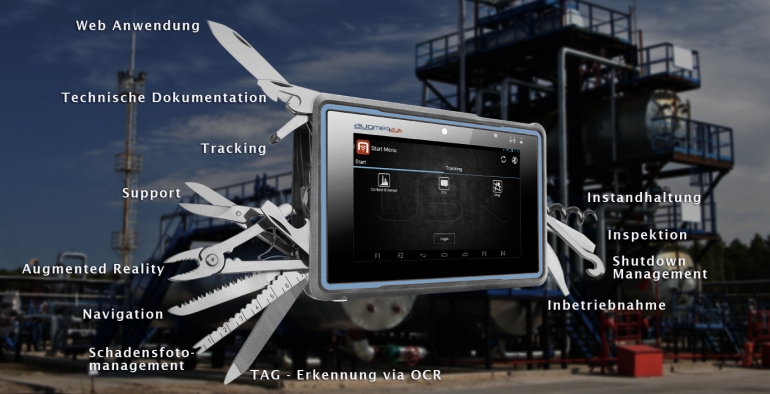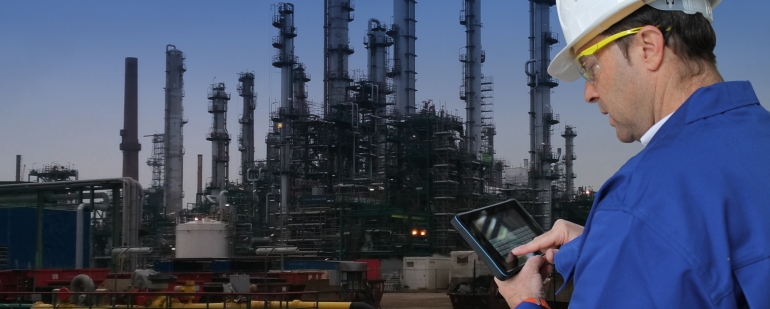Ubik Solutions operates as a competent partner of Augmensys in the Nordic market and is offering UBIK®, as well as accompanying consulting, support and implementation services. We asked Terkel Tofte, CEO of UBIK Solutions, some questions about the topic mobile data managment and Augmented Reality.
UBIK Solutions and Augmensys are now working together for quite some time. With you as a Partner for the Nordic market, we have found an excellent solution to communicate with the north. What were your first thoughts when you heard about the Augmented Reality software solution UBIK®? Which companies do you address primarily? From your point of view, why do these companies need UBIK®?
When I first heard about Augmented Reality for the industry in 2011, I understood that this is going to set the new trend in the industry. I think UBIK® is the tool that can lift the usage of existing solutions in the Power Generation, Oil and Gas, Chemical and Pharmaceutical industries to a new level. For years the focus has been around creating and maintaining data in various systems. There has been very little focus on bringing the data to work for the people that really need the information, on location. Once we leave the office, most work is still carried out with pen and paper which often results in poor quality and information gaps. There is definitely a potential for improving quality and safety and make work more efficient.
The offshore oil & gas industry is one of the most important industries on the Nordic market. Out of your experience, how open is this industry towards new technologies?
I recently visited the Offshore Northern Seas Oil and Gas exhibition in Stavanger, Norway, where I had the opportunity to meet many of the operators on the Norwegian Continental Shelf. In my experience there is an increasing awareness of the need for Mobile Data Management in these companies, and an openness towards learning more about which solutions can actually leverage the information usage.
Inspections, maintenance, safety etc. are important and indispensable issues in any industry. The conditions on oil platforms, chemical plants or thermal power plants are certainly tougher compared to the manufacturing industry. Does mobile data usage play an equally important role in those industries? Are there any additional special requirements you are aware of?
Indeed it will play a role, the environment in the process industry plants and offshore platforms is extremely harsh and hazardous. We therefore meet a requirement for intrinsically safe mobile devices. Such devices have not been available on the market earlier, but the good news is that many hardware manufacturers have seen the need and are now launching smartphones and tablets with ATEX Zone 1 and 2 certification.
Mobile data usage – no longer a trend but a must for any modern company: What do you think about this statement?
I totally agree. The amount of data in the industry has increased exponentially over the last decades, but the usage and accessibility has not increased with the same speed. So if you want full value of the enormous amount of data you create, you must ensure fast and secure access to the data you need in the context of your work – from anywhere, at any time, regardless from which IT system they were created in. One of our customers once said to us that if you want to attract the next generation of engineers and operators you simply cannot offer them to work with systems that are 20 years behind the technology they have at home. For example if they make a photo of the children it is instantly stored somewhere in the cloud and shared with grandparents and friends. Why can’t we work like that on the job?
Three years ago, Augmented Reality was known only from the “consumer” area. This technology is finding its place increasingly in the industry. Where do you see the opportunities and where the risks, considering this technology?
From the consumer area augmented reality is mostly known from applications like Peekfinder and Flightscanner, with limited value for the user besides the gimmick effect. In an industry application the AR technology is used to pre-filter the vast amount of data available to the exact needed context-based information needed in the situation the user is in. There is always a risk when you introduce a new technology that the users are reluctant implementing new ways of working. It is therefore important to have that in mind when setting up the system. Keep the user interface as simple as possible and make the AR context data pre-filtering as accurate as possible in order to minimize clicking and searching for information.
I can see many opportunities besides inspection and daily maintenance e.g. in the health- safety and environment area. I think the value of being notified about ongoing hot work before entering an area is of vital importance and this can potentially save human life. Also in the area of equipment safety you can ensure that a person has done initially on-location checks before systems are released for a safe start-up.
One main goal of Augmensys is to bring third part systems mobile, with the help of UBIK® . How important, do you think, is the “consolidation” part of various source systems, so that a mobile solution is successfully introduced and accepted by the users?
The consolidation of data is probably the most genius part of UBIK® and a key factor for the success. Consolidated data means that all data related to a certain item can be accessed, regardless of where or in which system the data are generated or stored. As a consequence, UBIK® also acts as a unified front end to third party systems which means that the user can retrieve the needed information without any knowledge about, access to, or privileges in the various expert systems.








Recent Comments